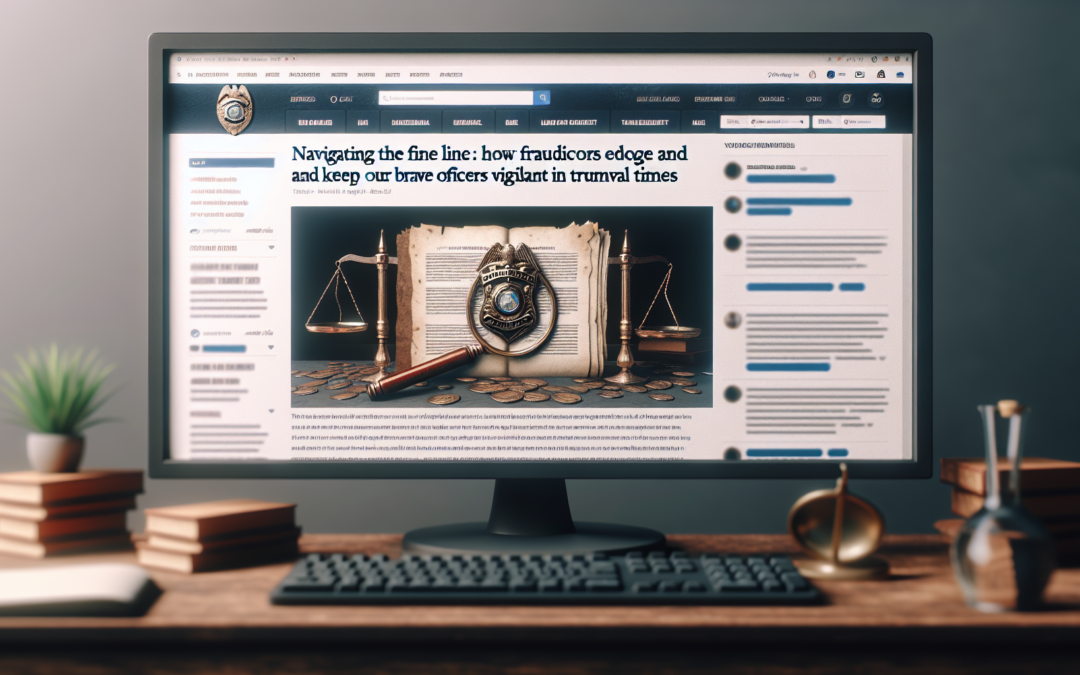Law Enforcement’s Unseen Battles: Frauditors and the Erosion of Public Trust
For most of society, the men and women in law enforcement are synonymous with safety and security—a constant in a world that can be frighteningly chaotic. Yet, a troubling reality is emerging, one that has as much to do with perception and civility as it does with law and order. The rise in encounters with “frauditors” serves as an unexpected test of patience and professionalism for officers striving to protect their communities. These provocateurs, wielding the First Amendment as a license, are often less concerned with upholding constitutional rights and more with capturing confrontations on camera.
The Challenge of Misguided Vigilance
Frauditors claim to be champions of transparency and accountability, but their tactics frequently blur the line between meaningful oversight and malicious incitement. These self-styled defenders of freedom often choose locations where no wrongdoing exists, yet seek to manufacture conflict. When confronted by officers, frauditors employ agitation, waiting for a flicker of emotion they can exploit. For law enforcement, it is a bitter pill to swallow—remaining composed in the face of deliberate provocation tests the limits of any human being. Their role, to maintain peace and order, suddenly shifts into ensuring their own conduct and intentions are not misunderstood in the court of public opinion.
The Stress of Constant Scrutiny
Underneath the uniform beats the heart of a public servant—a person compelled by duty but also by vulnerability to powerfully scripted narratives crafted by frauditors. The pervasive nature of social media magnifies their encounters, transforming isolated incidents into viral sensations. This is where the challenge for law enforcement doubles; the constant scrutiny can inadvertently stifle decisive action, as officers weigh immediate safety against potential mischaracterization of their intentions.
Officers find themselves grappling not with doubts about their training or mission but with public perception that can turn on a single viral video. They train hard to master the moral courage needed to not only enforce laws but to demonstrate restraint under pressure. Yet, the fear of a misstep—the potential to become the next trending hashtag or viral video—is a psychological warfare that weighs heavily on their hearts.
Frauditors: Misunderstanding and Misrepresenting
It is vital to acknowledge that not all frauditor intentions are inherently destructive; some have genuinely shone a light on practices warranting scrutiny. However, often overlooked is the developing undercurrent wherein some exploit the very freedoms they purport to protect—selling sensationalism over substantive dialogue. In these staged performances, where tension replaces reason, overtures of reform and cooperation quickly get lost, drowned out by the clamor of generated controversies. The outcome is not enhanced public safety but the breeding of mistrust between communities and those who vow to serve them.
Local police, deputies, and troopers share an unyielding devotion to uphold their communities’ safe and peaceful fever. Whenever misplaced vigilance transforms into contrived confrontation, it risks wedging unnecessary divides. Unsuspecting civilians caught in the milieu become proxies in a drama where the script is entirely out of alignment with the solutions needed.
Maintaining Honor Amid Disruption
Where do officers find solace in remediating this developing drama? Through unwavering professionalism during all aspects of their duty. The dedicated programs focusing on de-escalation techniques and discussions surrounding legitimate constitutional testing present opportunities for law enforcement to extend strong principles of engagement—emphasizing clarity of their objectives to the public they protect.
A significant portion lies in continuous engagement with their communities outside of these viral-established oppression zones. Hosting conversations that reiterate the dual sanctity of self-expression and safety. Understanding harvested directly from their constituents’ needs stands as a bulwark to evolving community investment in true public health.
To witness an evocative discourse tackling this very issue, tune in to “The John Ligato Show,” where real narratives and unrivaled conversations on these law enforcement dilemmas continue (YouTube or subscribe here: John Ligato’s YouTube Channel). Engage deeper with current intentions of remedy visible through dynamic interactions provided at John Ligato Show on Facebook.
Let us #HonorTheBadge and nurture true stalwartness organically—but this is not achieved through segments built on scripted intimidation but rather a collaboration of insight that fosters love, understanding, and, ultimately, genuine security.

Recent Comments